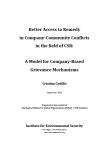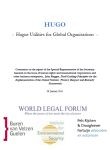Description
In 2008, the United Nations Special Representative for Business and Human Rights, Professor John Ruggie, proposed the “Protect, Respect and Remedy Framework”, a policy framework which rests on three pillars: the state duty to protect against human rights abuses, the corporate responsibility to respect human rights and greater access for victims to effective (judicial and non-judicial) remedies.
In 2010 the World Legal Forum launched the programme: Hague Utilities for Global Organisations (HUGO).
This programme, subsidised by the Dutch Ministry of Economic Affairs, Agriculture and Innovation and the Municipality of The Hague, aims to, inter alia, investigate the feasibility of the establishment of a conflict management facility on CSR, with an emphasis on disputes involving human rights, labour and environmental issues.
WLF’s partners in this programme are the Netherlands based law firms Pels Rijcken & Droogleever Fortuijn and Buren van Velzen Guelen, the Institute for Environmental Security, consultants dr. Tineke Lambooy and prof. Jan Eijsbouts, the Netherlands Institute for Advanced Study, and Science Alliance B.V.
CSR related conflicts between business enterprises and individuals, civil society organisations and other stakeholders are characterized by inequality of power and resources, cultural and political differences, internal political conflicts in host states and absence of rule of law or weak law enforcement in the countries in question. While considerable expertise and practices have been built up in conflict management systems with sophisticated early dispute resolution mechanisms such as mediation and conciliation in so called “business to business conflicts”, and the basics of these mechanisms are valuable for CSR related conflicts, these mechanisms may need adaptation for the types of conflicts addressed by the Ruggie Framework.
With the CSR pillar of the HUGO programme, WLF and its partners aim to contribute to the operationalisation of the third pillar of the Ruggie Framework greater access for victims to effective remedies. In Principle 29(g) of the Draft Guiding Principles, Professor Ruggie emphasises that operational level grievance mechanisms should be based on dialogue and engagement, leaving adjudication to independent third party mechanisms, whether judicial or non-judicial. WLF has embarked on a project to investigate the feasibility of the establishment of a non-judicial conflict management facility for disputes between business enterprises and stakeholders in the field of human rights, environment and labour. This institute intends to focus on facilitating in the settlement of these types of disputes.
Since the launch of the HUGO programme, considerable steps have been made toward the development of the facility. The Corporate Social Responsibility Initiative at the Harvard Kennedy School of Government conducted research into the need for a CSR facility. The results of the research were discussed during a WLF expert meeting, held in October 2010. In December 2010, WLF held an annual conference dedicated to the Ruggie Framework.





